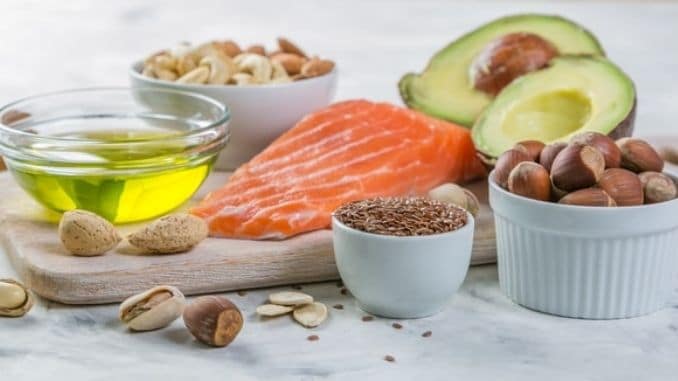
The omnivore diet is a flexible approach to eating that includes both plant-based and animal-based foods.
Unlike restrictive diets like vegetarian or vegan diets | 404, it embraces variety, letting you enjoy fruits, vegetables, grains, dairy, meat, and fish.
This balanced approach is ideal for those looking for a practical way to get a full range of nutrients without cutting out entire food groups.
In this article, we’ll dive into the benefits of having an omnivorous diet, tips for building balanced meals, and how to make mindful food choices.
Whether you want more energy, stronger bones, or simply a healthy way of eating, the omnivore diet offers a much more versatile and sustainable path to wellness compared to a meat or plant-based diet alone.
What Is an Omnivore Diet?
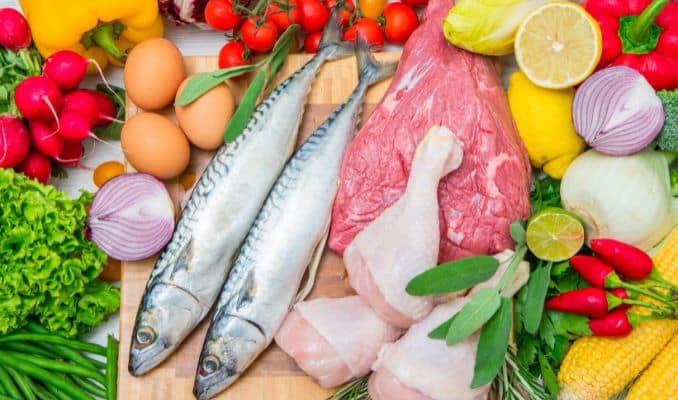
An omnivore is an organism that eats both plants and animals.
In nature, many animals, including humans, are considered omnivores because we are biologically equipped to digest various foods.
This means that humans can get nutrients from plant and animal sources, making it possible to enjoy a balanced mix of fruits, vegetables, grains, dairy, meat, and fish.
An omnivore diet focuses on this natural flexibility, allowing people to choose foods from plant and animal sources.
Unlike diets that cut out entire food groups, the omnivore diet includes many options, making it adaptable to different health needs, lifestyles, and cultural food traditions.
For example, someone following an omnivore diet can choose to have more plant-based meals, include more protein from animal sources, or balance both depending on what works best for them.
This adaptability is one of the main strengths of the omnivore diet.
It doesn’t force strict rules but instead encourages balanced eating based on personal goals, tastes, and health needs.
Whether looking for variety, aiming for balanced nutrition, or adapting to certain dietary needs, the omnivore diet offers a versatile way to meet your needs while enjoying a diverse range of foods.
Key Nutritional Benefits of an Omnivore Diet
An omnivore diet provides a well-rounded range of nutrients by combining plant and animal foods (Clarys et al., 2013) [1].
This balanced approach offers several key nutritional benefits that support overall health and wellness:
1. Balanced Nutrient Intake
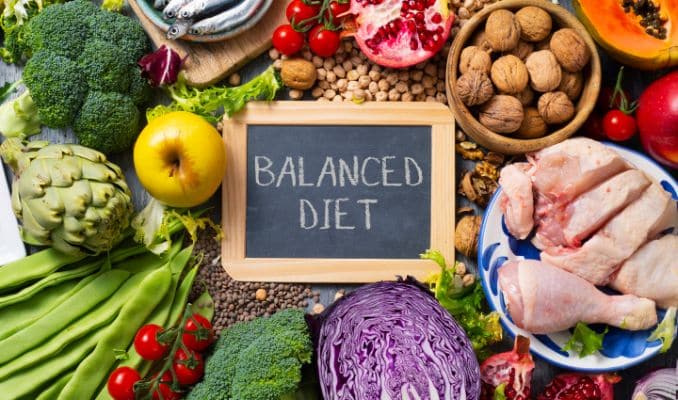
Eating plant and animal foods gives access to a wider variety of nutrients.
Plants provide fiber, vitamins, and antioxidants, while animal products offer protein, certain fats, and nutrients that are harder to find in plants alone.
Together, they help create a balanced, nutrient-dense diet that supports many aspects of health.
2. Complete Proteins
Animal products like meat, dairy, and eggs are complete protein sources, meaning they contain all the essential amino acids our bodies need to function (Ajomiwe et al., 2024) [2].
These proteins are easy to digest and complement the proteins from plant sources, ensuring a full spectrum of amino acids for muscle repair, immune support, and energy.
3. Essential Fats
The omnivore diet includes healthy fats, such as omega-3 fatty acids found in fish and various plant oils like olive oil.
Omega-3s are crucial for heart health, brain function, and reducing inflammation.
Including both plant and animal fats provides a good balance of healthy fats that support long-term wellness.
4. Vitamins and Minerals
Animal products are a natural source of vitamin B12, iron, and calcium, essential for energy, strong bones, and healthy blood.
Plant foods contribute fiber, folate, and a variety of vitamins like C and E that can hardly be found in meat products (Neufingerl & Eilander, 2022) [3].
Together, the nutrients from both groups help cover a broad spectrum of needs, making it easier to meet daily recommendations for essential vitamins and minerals.
In short, the omnivore diet’s mix of plant and animal foods ensures a diverse and complete nutrient intake, supporting heart health, muscle function, and energy levels.
This balance makes it a strong choice for people looking to nourish their bodies with various nutrient sources.
Comparing Omnivorous, Vegetarian, and Vegan Diets
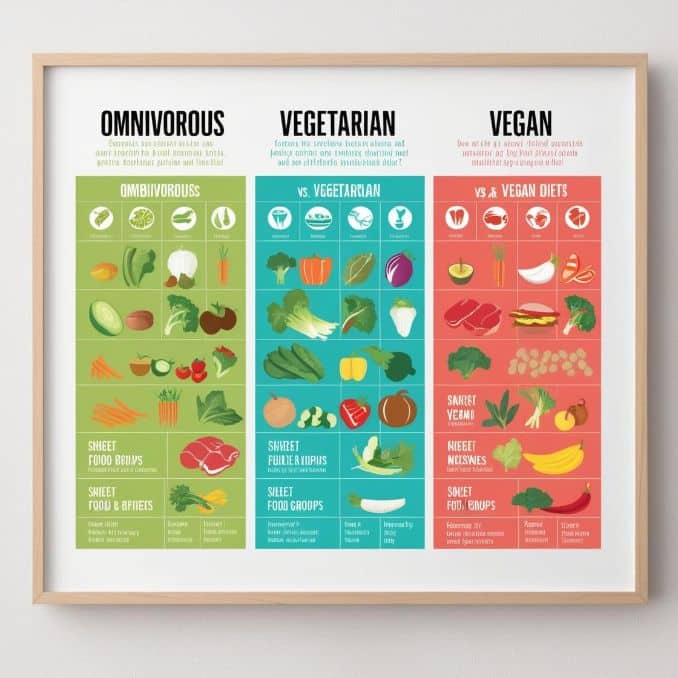
Each diet—omnivorous, vegetarian, and vegan—offers unique ways to meet nutritional needs based on personal preferences, ethical considerations, and health goals.
Here’s a quick overview of each approach and how they differ in terms of food choices and nutritional focus.
Omnivore Diet
An omnivore diet includes both plant-based and animal-based foods, such as fruits, vegetables, grains, dairy, meat, and fish.
This balanced approach provides access to a wide range of nutrients, including complete proteins, healthy fats, vitamins, and minerals from diverse sources.
Many find the omnivore diet flexible and adaptable to personal health needs and cultural preferences.
Vegetarian
A vegetarian diet excludes meat and fish but typically includes dairy and eggs, along with plenty of plant-based foods like fruits, vegetables, grains, and legumes.
This diet is often chosen for ethical or health reasons and can support nutritional needs when well-planned to include diverse plant proteins and nutrient-rich foods.
Vegan Diets
A vegan diet excludes all animal products, including meat, dairy, eggs, and sometimes even honey.
This fully plant-based approach focuses on fruits, vegetables, grains, nuts, seeds, and legumes.
While vegan diets can be highly nutritious and low in saturated fats, they often require careful planning to ensure adequate intake of essential nutrients, such as vitamin B12, iron, and omega-3s.
How to Build a Balanced Omnivore Diet
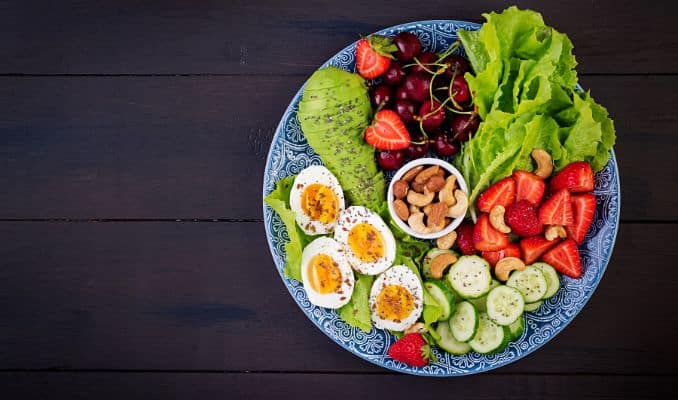
Creating a balanced omnivore diet involves choosing various nutritious foods from plant and animal sources.
Here are some key tips to help build meals that are both satisfying and nourishing:
1. Focus on Whole Foods
Prioritize whole, minimally processed foods like fresh fruits, vegetables, whole grains, lean meats, fish, eggs, and nuts.
Whole foods are packed with natural nutrients and are less likely to contain added sugars, unhealthy fats, or preservatives, common in processed foods.
Choosing whole foods supports better energy levels, digestion, and overall health.
2. Balanced Portions
Aim to create balanced meals by including portions from each main food group: protein, vegetables, whole grains, and healthy fats.
For example, fill half of your plate with colorful vegetables, a quarter with a lean protein (like chicken or beans), and the remaining quarter with a whole grain (like brown rice or quinoa).
Adding a small amount of healthy fat, like olive oil or avocado, rounds the meal and helps you feel fuller for longer.
3. Include a Variety of Plant Foods
Eating a wide range of fruits, vegetables, legumes, and whole grains ensures you get plenty of fiber, vitamins, and minerals.
Each type of plant food offers different nutrients, so mixing it up helps cover more of your body’s needs.
For example, berries are high in antioxidants, leafy greens are rich in vitamins, and grains provide essential carbohydrates and minerals.
This variety also keeps meals interesting and enjoyable.
4. Mindful Animal Product Consumption
Focus on high-quality animal products, such as lean meats, poultry, eggs, and sustainably sourced fish.
Lean meats and fish provide high-quality protein without excess saturated fat, and choosing sustainably sourced options supports environmental and personal health.
Try to incorporate these foods in moderation, using them as part of a varied diet with plenty of plant-based foods.
By focusing on whole foods, balancing your portions, including diverse plant foods, and being mindful of your animal product choices, you can build a healthier omnivore diet.
This approach supports long-term health and allows for flexibility in meeting your tastes and nutritional needs.
Potential Challenges and Considerations
1. Overconsumption of Processed Foods
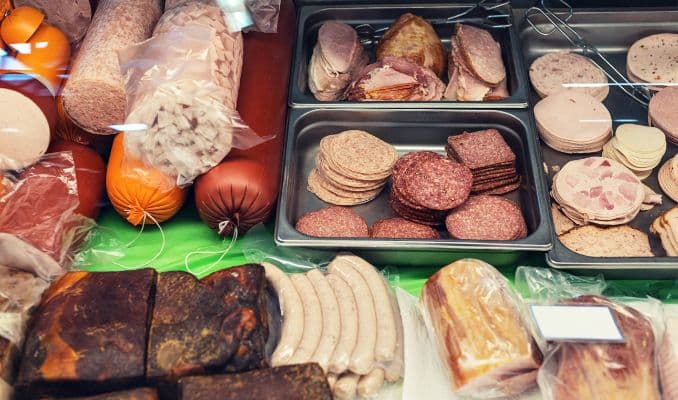
One of the risks of an omnivore diet is the potential to include too many processed foods or high-fat animal products, which can add unnecessary sugars, unhealthy fats, and excess sodium to your diet.
To avoid this, focus on whole, minimally processed foods whenever possible and keep processed meats, fried foods, and sugary snacks to a minimum.
2. Environmental Impact
Meat and dairy production can have significant environmental impacts, including higher greenhouse gas emissions, deforestation, and water usage.
To reduce your diet’s environmental footprint, consider choosing sustainably sourced animal products, reducing red meat intake, and balancing your meals with more plant-based foods.
Opting for local and seasonal produce can also help lessen environmental impact.
3. Food Allergies and Sensitivities
Individuals with food allergies or sensitivities, such as dairy or gluten, can still enjoy an omnivore diet by making substitutions.
For example, those with dairy allergies can use plant-based milk or gluten-free grains like quinoa or rice as substitutes for wheat-based products.
The omnivore diet’s flexibility allows easy adjustments to meet various dietary needs.
4. Ethical Considerations
For some, the ethical implications of consuming animal products are a concern.
Many people address these concerns by choosing high-welfare, sustainably sourced, or organic animal products.
Reducing meat intake and incorporating more plant-based meals can also help align food choices with ethical values while following an omnivore diet.
Sample One-Day Omnivore Diet Meal Plan
With the knowledge you now have you can start planning for a meal plan of your choice.
Since the omnivore diet is less restrictive compared to others, you have plenty of food options to choose from.
Granted, you should also keep in mind the necessary essential nutrients and health benefits they provide and not just focus on the taste
Here is a sample of a meal plan that follows the omnivore diet plan structure:
Breakfast

Scrambled Eggs with Spinach, Whole-Grain Toast, and Avocado
- Scrambled Eggs – Two eggs scrambled with fresh spinach for protein and iron. Add a handful of cherry tomatoes or bell peppers for extra color and vitamins.
- Whole-Grain Toast – One slice of whole-grain toast, which provides fiber and complex carbohydrates to keep you feeling full and energized.
- Avocado – Half an avocado sliced on the toast, adding healthy fats and potassium. This combination supports heart health and provides a creamy texture that pairs well with the eggs.
Mid-Morning Snack
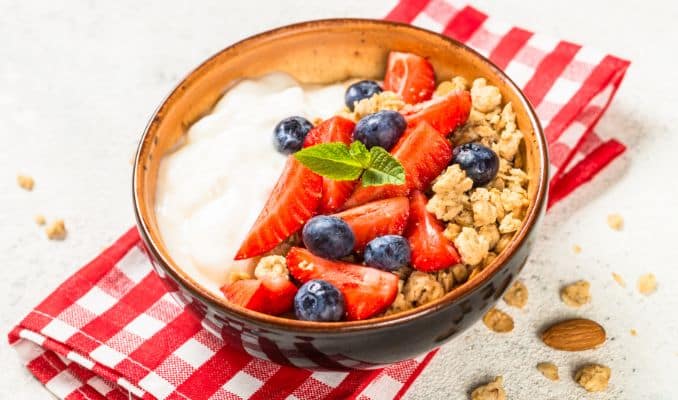
Greek Yogurt with Berries and a Sprinkle of Nuts
- Greek Yogurt: Plain, unsweetened Greek yogurt for a protein boost and probiotics to support gut health.
- Berries: A handful of mixed berries (such as blueberries, raspberries, or blackberries) add fiber, antioxidants, and natural sweetness.
- Nuts: A sprinkle of almonds or walnuts for extra healthy fats and crunch.
Lunch

Grilled Chicken Salad with Colorful Vegetables and Quinoa
- Grilled Chicken: Lean grilled chicken breast (about 3–4 ounces) for a source of complete protein.
- Salad Base: Mixed greens (like spinach, arugula, and romaine) for vitamins and fiber.
- Colorful Vegetables: Add a mix of cherry tomatoes, cucumber slices, shredded carrots, and bell peppers for various vitamins, minerals, and antioxidants.
- Quinoa: A small side of quinoa (about ½ cup) for fiber and complex carbohydrates, which adds extra texture and protein to the meal.
- Dressing: Drizzle with a simple vinaigrette made from olive oil and balsamic vinegar for healthy fats and flavor.
Afternoon Snack
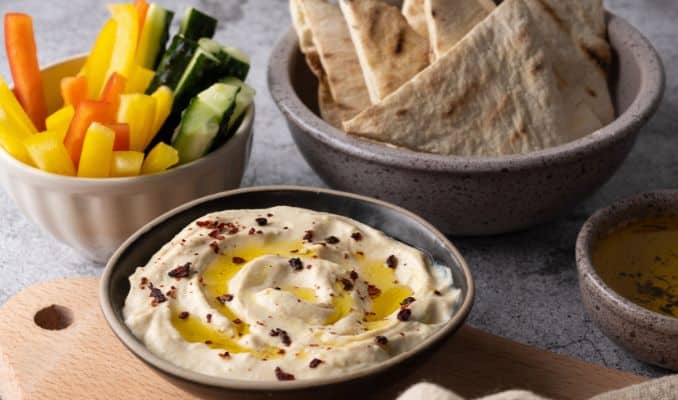
Hummus Platter with Carrot Sticks, Cucumber Slices, and Pita Bread
- Hummus: A small bowl (about ¼ cup) of hummus provides a creamy, flavorful base rich in plant-based protein, fiber, and healthy fats.
- Carrot Sticks: Fresh, crunchy carrot sticks add natural sweetness and vibrant color to the platter.
- Cucumber Slices: Sliced cucumbers are hydrating, refreshing, and low in calories.
- Pita Bread: Whole-grain or regular pita bread, cut into small wedges, rounds out the platter by adding a bit of heartiness and complex carbohydrates.
Dinner

Salmon with Steamed Vegetables and Brown Rice
- Salmon: A 4–5 ounce portion of grilled or baked salmon, rich in omega-3 fatty acids and protein, supporting heart and brain health.
- Steamed Vegetables: A mix of broccoli, carrots, and green beans for fiber, vitamins, and antioxidants. These colorful veggies contribute to a visually appealing and nutrient-rich plate.
Brown Rice: About ½ cup of brown rice is a complex carbohydrate source that provides fiber and sustained energy.
Conclusion
The omnivore diet offers a more flexible and balanced way to enjoy both plant-based and animal-based foods,
By focusing on a variety of food options rather than sticking to narrow carnivore or plant-based diets. This approach helps you meet nutritional needs without cutting out food groups.
With its versatility, people undergoing omnivore diets can easily adapt to personal tastes and goals, making it a sustainable choice for long-term health.
Remember, balance and moderation are key—enjoy a mix of foods, and consider consulting a nutritionist for any specific dietary advice.
For your guide to the best foods to heal and slim your body, check out The Best Foods that Rapidly Slim & Heal in 7 Days, here!
Frequently Ask Questions
Can An Omnivore Diet Be Healthy?
Yes, when focused on whole, minimally processed foods and balanced portions, an omnivore diet can be a healthy and sustainable way of eating.
How Does an Omnivore Diet Compare To A Vegetarian or Vegan Diet?
An omnivore diet includes animal products, offering nutrients like vitamin B12 and iron, less abundant in plant-based diets. However, both dietary approaches can be healthy when well-planned.
Are There Environmental Concerns with An Omnivore Diet?
Meat and dairy production can have significant environmental impacts. Choosing sustainably sourced animal products and incorporating more plant-based foods can help mitigate these effects.
Can I Follow An Omnivore Diet if I Have Food Allergies?
Yes, the flexibility of an omnivore diet allows for substitutions to accommodate allergies, such as using plant-based milk alternatives for dairy allergies.
How can I ensure I’m eating a balanced omnivore diet?
Focus on whole foods, include a variety of plant and animal sources, and pay attention to portion sizes to create balanced meals. Consulting with a nutritionist can provide personalized guidance.
Is an omnivore diet suitable for weight loss?
Yes, by emphasizing nutrient-dense foods and controlling portion sizes, an omnivore diet can support weight management goals.

